Education Skills for Workplace: Analyzing Effective Teamwork
VerifiedAdded on 2023/06/18
|10
|2551
|191
Report
AI Summary
This report explores the significance of education skills in fostering effective teamwork within a workplace environment. It identifies methods for developing high-performing teams, emphasizing the importance of clear communication, trust-building, encouraging contributions, and providing constructive feedback. The report also analyzes the impacts of effective teamwork on team success, such as fostering cooperation, broadening perspectives, increasing productivity, relieving stress, and promoting work synergy. Barriers to effective teamwork, including communication challenges, poor performance, team management issues, conflicts, lack of transparency, and low engagement, are examined. Tuckman's theory is presented as a relevant model for team development, outlining the stages of forming, storming, norming, and performing. The report concludes that effective team management is crucial for organizational success and highlights the importance of identifying and developing team management skills.
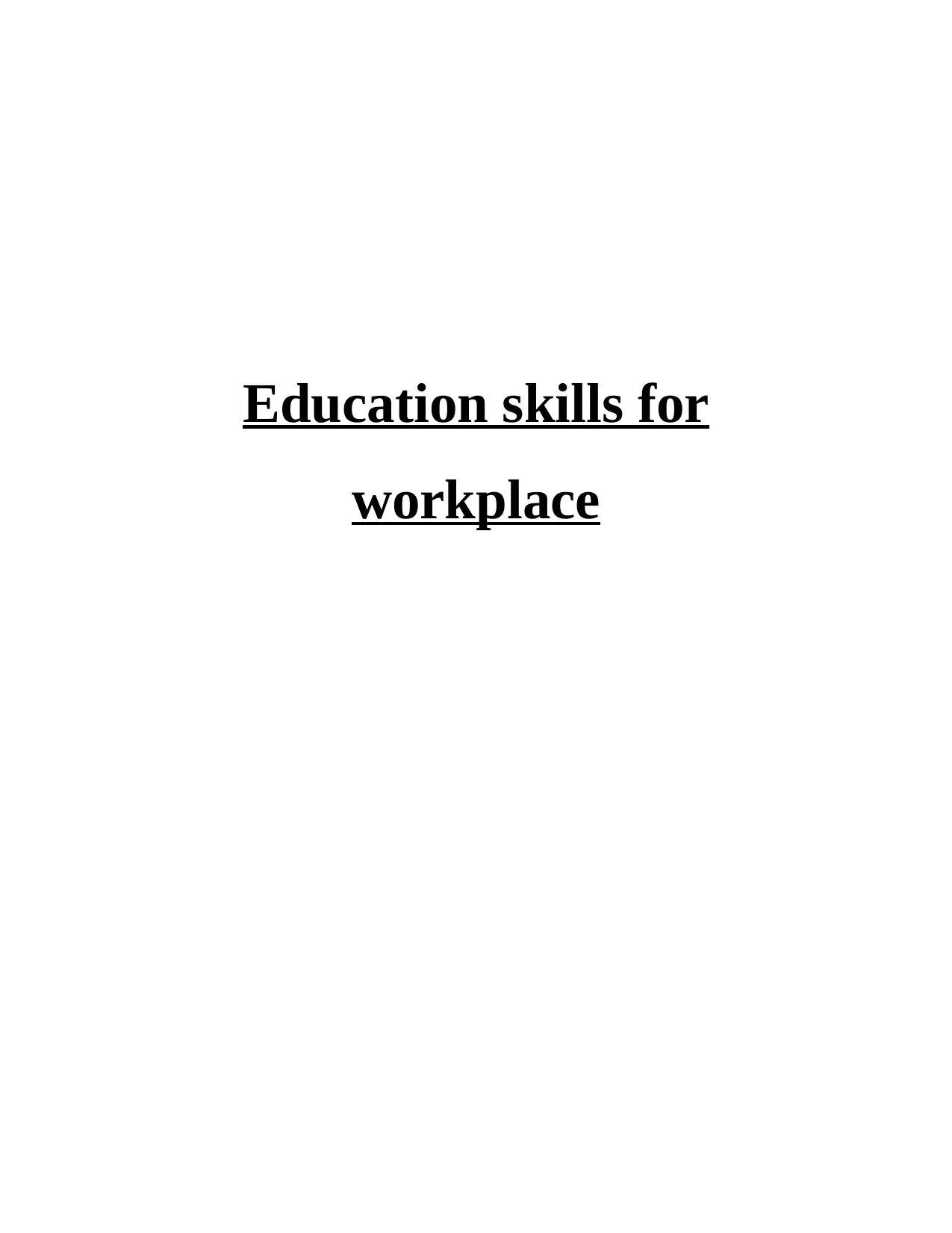
Education skills for
workplace
workplace
Paraphrase This Document
Need a fresh take? Get an instant paraphrase of this document with our AI Paraphraser
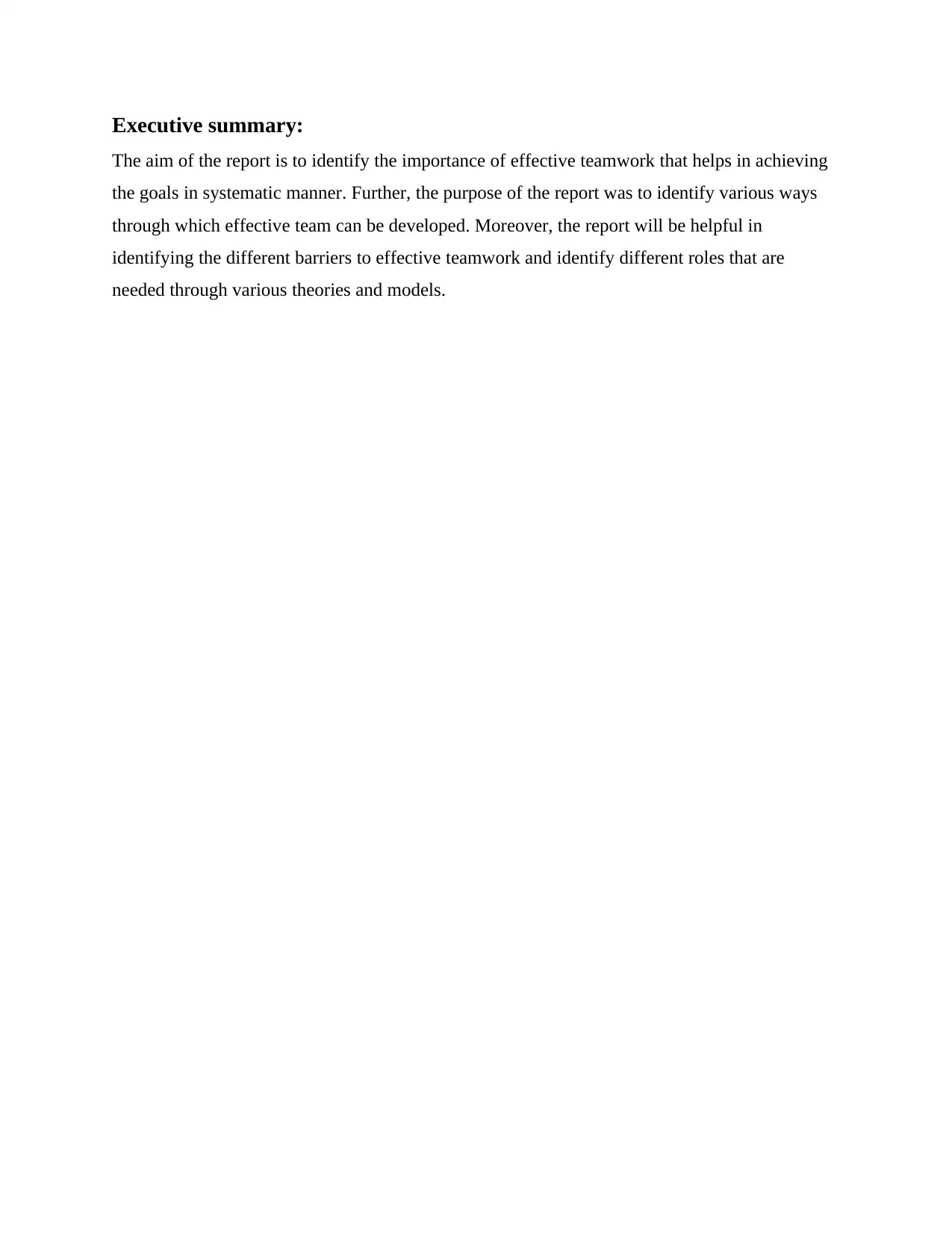
Executive summary:
The aim of the report is to identify the importance of effective teamwork that helps in achieving
the goals in systematic manner. Further, the purpose of the report was to identify various ways
through which effective team can be developed. Moreover, the report will be helpful in
identifying the different barriers to effective teamwork and identify different roles that are
needed through various theories and models.
The aim of the report is to identify the importance of effective teamwork that helps in achieving
the goals in systematic manner. Further, the purpose of the report was to identify various ways
through which effective team can be developed. Moreover, the report will be helpful in
identifying the different barriers to effective teamwork and identify different roles that are
needed through various theories and models.
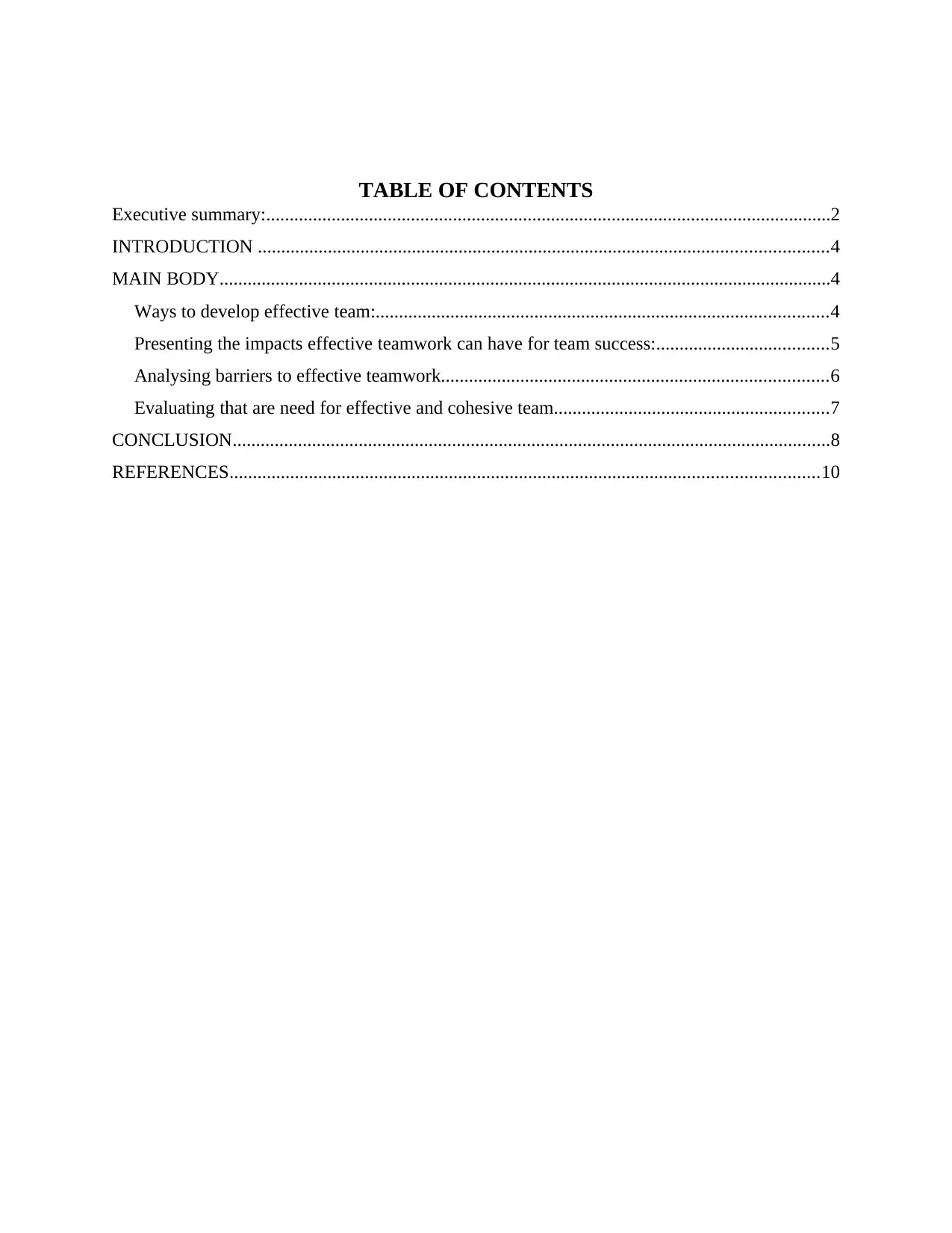
TABLE OF CONTENTS
Executive summary:.........................................................................................................................2
INTRODUCTION ..........................................................................................................................4
MAIN BODY...................................................................................................................................4
Ways to develop effective team:.................................................................................................4
Presenting the impacts effective teamwork can have for team success:.....................................5
Analysing barriers to effective teamwork...................................................................................6
Evaluating that are need for effective and cohesive team...........................................................7
CONCLUSION................................................................................................................................8
REFERENCES..............................................................................................................................10
Executive summary:.........................................................................................................................2
INTRODUCTION ..........................................................................................................................4
MAIN BODY...................................................................................................................................4
Ways to develop effective team:.................................................................................................4
Presenting the impacts effective teamwork can have for team success:.....................................5
Analysing barriers to effective teamwork...................................................................................6
Evaluating that are need for effective and cohesive team...........................................................7
CONCLUSION................................................................................................................................8
REFERENCES..............................................................................................................................10
⊘ This is a preview!⊘
Do you want full access?
Subscribe today to unlock all pages.

Trusted by 1+ million students worldwide
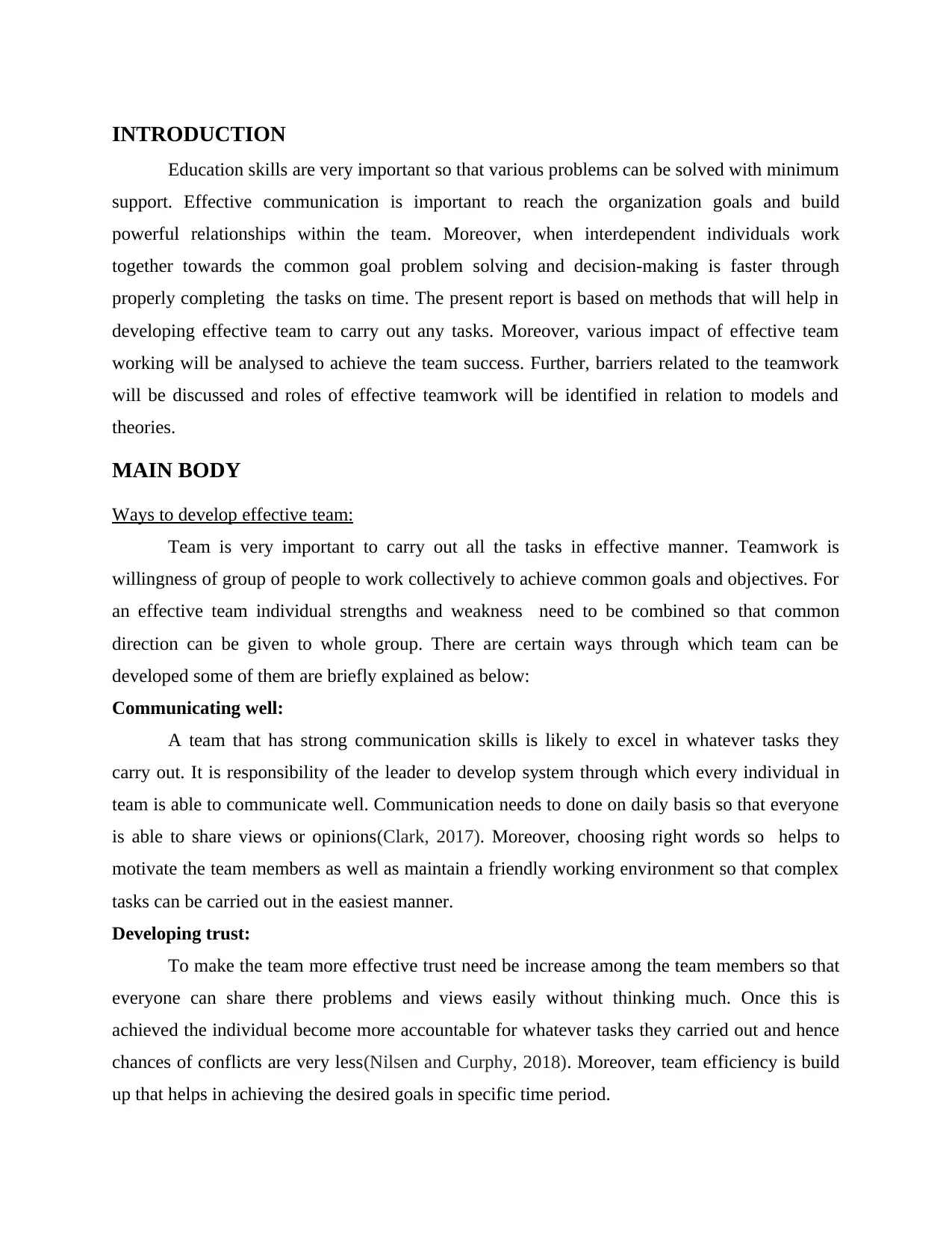
INTRODUCTION
Education skills are very important so that various problems can be solved with minimum
support. Effective communication is important to reach the organization goals and build
powerful relationships within the team. Moreover, when interdependent individuals work
together towards the common goal problem solving and decision-making is faster through
properly completing the tasks on time. The present report is based on methods that will help in
developing effective team to carry out any tasks. Moreover, various impact of effective team
working will be analysed to achieve the team success. Further, barriers related to the teamwork
will be discussed and roles of effective teamwork will be identified in relation to models and
theories.
MAIN BODY
Ways to develop effective team:
Team is very important to carry out all the tasks in effective manner. Teamwork is
willingness of group of people to work collectively to achieve common goals and objectives. For
an effective team individual strengths and weakness need to be combined so that common
direction can be given to whole group. There are certain ways through which team can be
developed some of them are briefly explained as below:
Communicating well:
A team that has strong communication skills is likely to excel in whatever tasks they
carry out. It is responsibility of the leader to develop system through which every individual in
team is able to communicate well. Communication needs to done on daily basis so that everyone
is able to share views or opinions(Clark, 2017). Moreover, choosing right words so helps to
motivate the team members as well as maintain a friendly working environment so that complex
tasks can be carried out in the easiest manner.
Developing trust:
To make the team more effective trust need be increase among the team members so that
everyone can share there problems and views easily without thinking much. Once this is
achieved the individual become more accountable for whatever tasks they carried out and hence
chances of conflicts are very less(Nilsen and Curphy, 2018). Moreover, team efficiency is build
up that helps in achieving the desired goals in specific time period.
Education skills are very important so that various problems can be solved with minimum
support. Effective communication is important to reach the organization goals and build
powerful relationships within the team. Moreover, when interdependent individuals work
together towards the common goal problem solving and decision-making is faster through
properly completing the tasks on time. The present report is based on methods that will help in
developing effective team to carry out any tasks. Moreover, various impact of effective team
working will be analysed to achieve the team success. Further, barriers related to the teamwork
will be discussed and roles of effective teamwork will be identified in relation to models and
theories.
MAIN BODY
Ways to develop effective team:
Team is very important to carry out all the tasks in effective manner. Teamwork is
willingness of group of people to work collectively to achieve common goals and objectives. For
an effective team individual strengths and weakness need to be combined so that common
direction can be given to whole group. There are certain ways through which team can be
developed some of them are briefly explained as below:
Communicating well:
A team that has strong communication skills is likely to excel in whatever tasks they
carry out. It is responsibility of the leader to develop system through which every individual in
team is able to communicate well. Communication needs to done on daily basis so that everyone
is able to share views or opinions(Clark, 2017). Moreover, choosing right words so helps to
motivate the team members as well as maintain a friendly working environment so that complex
tasks can be carried out in the easiest manner.
Developing trust:
To make the team more effective trust need be increase among the team members so that
everyone can share there problems and views easily without thinking much. Once this is
achieved the individual become more accountable for whatever tasks they carried out and hence
chances of conflicts are very less(Nilsen and Curphy, 2018). Moreover, team efficiency is build
up that helps in achieving the desired goals in specific time period.
Paraphrase This Document
Need a fresh take? Get an instant paraphrase of this document with our AI Paraphraser
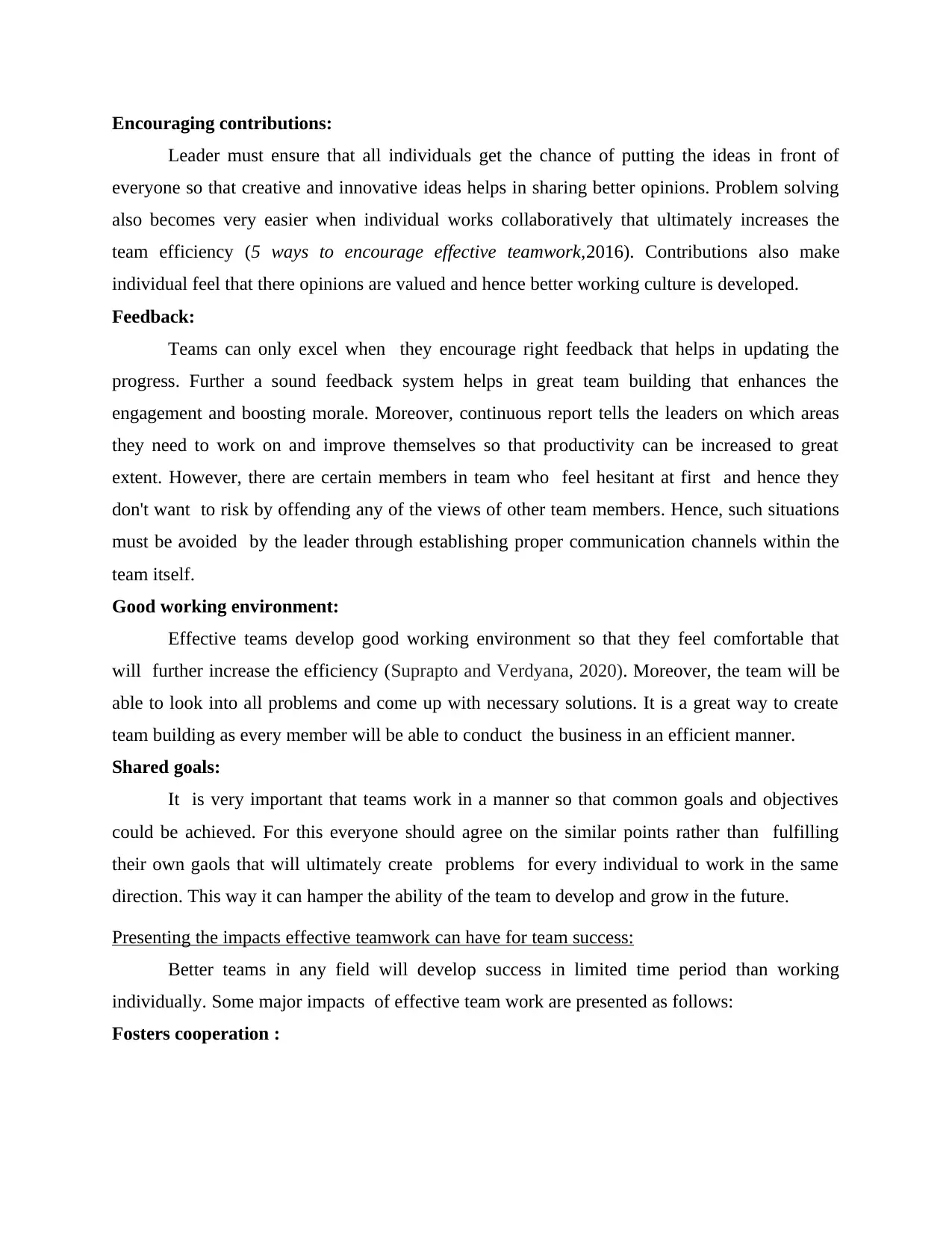
Encouraging contributions:
Leader must ensure that all individuals get the chance of putting the ideas in front of
everyone so that creative and innovative ideas helps in sharing better opinions. Problem solving
also becomes very easier when individual works collaboratively that ultimately increases the
team efficiency (5 ways to encourage effective teamwork,2016). Contributions also make
individual feel that there opinions are valued and hence better working culture is developed.
Feedback:
Teams can only excel when they encourage right feedback that helps in updating the
progress. Further a sound feedback system helps in great team building that enhances the
engagement and boosting morale. Moreover, continuous report tells the leaders on which areas
they need to work on and improve themselves so that productivity can be increased to great
extent. However, there are certain members in team who feel hesitant at first and hence they
don't want to risk by offending any of the views of other team members. Hence, such situations
must be avoided by the leader through establishing proper communication channels within the
team itself.
Good working environment:
Effective teams develop good working environment so that they feel comfortable that
will further increase the efficiency (Suprapto and Verdyana, 2020). Moreover, the team will be
able to look into all problems and come up with necessary solutions. It is a great way to create
team building as every member will be able to conduct the business in an efficient manner.
Shared goals:
It is very important that teams work in a manner so that common goals and objectives
could be achieved. For this everyone should agree on the similar points rather than fulfilling
their own gaols that will ultimately create problems for every individual to work in the same
direction. This way it can hamper the ability of the team to develop and grow in the future.
Presenting the impacts effective teamwork can have for team success:
Better teams in any field will develop success in limited time period than working
individually. Some major impacts of effective team work are presented as follows:
Fosters cooperation :
Leader must ensure that all individuals get the chance of putting the ideas in front of
everyone so that creative and innovative ideas helps in sharing better opinions. Problem solving
also becomes very easier when individual works collaboratively that ultimately increases the
team efficiency (5 ways to encourage effective teamwork,2016). Contributions also make
individual feel that there opinions are valued and hence better working culture is developed.
Feedback:
Teams can only excel when they encourage right feedback that helps in updating the
progress. Further a sound feedback system helps in great team building that enhances the
engagement and boosting morale. Moreover, continuous report tells the leaders on which areas
they need to work on and improve themselves so that productivity can be increased to great
extent. However, there are certain members in team who feel hesitant at first and hence they
don't want to risk by offending any of the views of other team members. Hence, such situations
must be avoided by the leader through establishing proper communication channels within the
team itself.
Good working environment:
Effective teams develop good working environment so that they feel comfortable that
will further increase the efficiency (Suprapto and Verdyana, 2020). Moreover, the team will be
able to look into all problems and come up with necessary solutions. It is a great way to create
team building as every member will be able to conduct the business in an efficient manner.
Shared goals:
It is very important that teams work in a manner so that common goals and objectives
could be achieved. For this everyone should agree on the similar points rather than fulfilling
their own gaols that will ultimately create problems for every individual to work in the same
direction. This way it can hamper the ability of the team to develop and grow in the future.
Presenting the impacts effective teamwork can have for team success:
Better teams in any field will develop success in limited time period than working
individually. Some major impacts of effective team work are presented as follows:
Fosters cooperation :
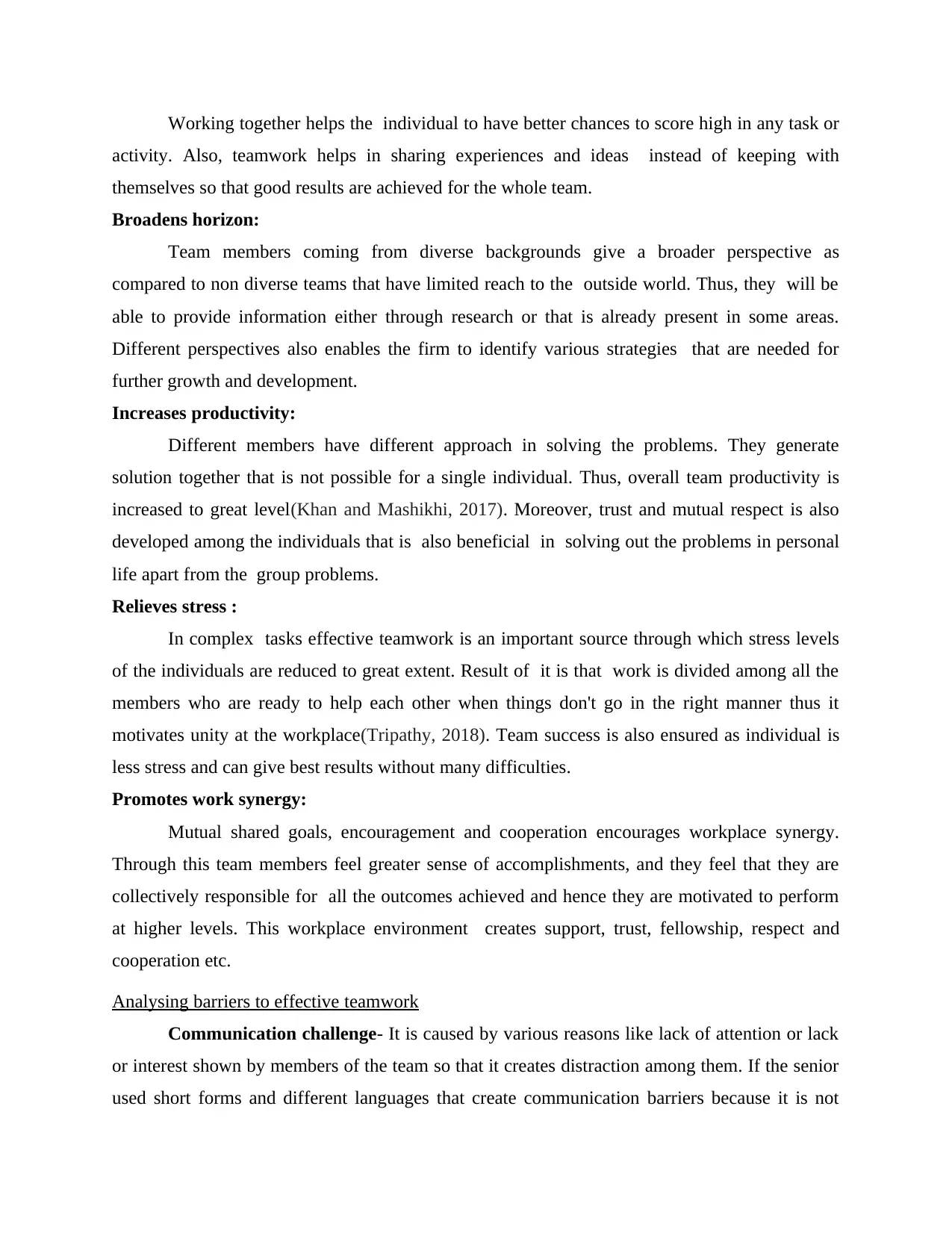
Working together helps the individual to have better chances to score high in any task or
activity. Also, teamwork helps in sharing experiences and ideas instead of keeping with
themselves so that good results are achieved for the whole team.
Broadens horizon:
Team members coming from diverse backgrounds give a broader perspective as
compared to non diverse teams that have limited reach to the outside world. Thus, they will be
able to provide information either through research or that is already present in some areas.
Different perspectives also enables the firm to identify various strategies that are needed for
further growth and development.
Increases productivity:
Different members have different approach in solving the problems. They generate
solution together that is not possible for a single individual. Thus, overall team productivity is
increased to great level(Khan and Mashikhi, 2017). Moreover, trust and mutual respect is also
developed among the individuals that is also beneficial in solving out the problems in personal
life apart from the group problems.
Relieves stress :
In complex tasks effective teamwork is an important source through which stress levels
of the individuals are reduced to great extent. Result of it is that work is divided among all the
members who are ready to help each other when things don't go in the right manner thus it
motivates unity at the workplace(Tripathy, 2018). Team success is also ensured as individual is
less stress and can give best results without many difficulties.
Promotes work synergy:
Mutual shared goals, encouragement and cooperation encourages workplace synergy.
Through this team members feel greater sense of accomplishments, and they feel that they are
collectively responsible for all the outcomes achieved and hence they are motivated to perform
at higher levels. This workplace environment creates support, trust, fellowship, respect and
cooperation etc.
Analysing barriers to effective teamwork
Communication challenge- It is caused by various reasons like lack of attention or lack
or interest shown by members of the team so that it creates distraction among them. If the senior
used short forms and different languages that create communication barriers because it is not
activity. Also, teamwork helps in sharing experiences and ideas instead of keeping with
themselves so that good results are achieved for the whole team.
Broadens horizon:
Team members coming from diverse backgrounds give a broader perspective as
compared to non diverse teams that have limited reach to the outside world. Thus, they will be
able to provide information either through research or that is already present in some areas.
Different perspectives also enables the firm to identify various strategies that are needed for
further growth and development.
Increases productivity:
Different members have different approach in solving the problems. They generate
solution together that is not possible for a single individual. Thus, overall team productivity is
increased to great level(Khan and Mashikhi, 2017). Moreover, trust and mutual respect is also
developed among the individuals that is also beneficial in solving out the problems in personal
life apart from the group problems.
Relieves stress :
In complex tasks effective teamwork is an important source through which stress levels
of the individuals are reduced to great extent. Result of it is that work is divided among all the
members who are ready to help each other when things don't go in the right manner thus it
motivates unity at the workplace(Tripathy, 2018). Team success is also ensured as individual is
less stress and can give best results without many difficulties.
Promotes work synergy:
Mutual shared goals, encouragement and cooperation encourages workplace synergy.
Through this team members feel greater sense of accomplishments, and they feel that they are
collectively responsible for all the outcomes achieved and hence they are motivated to perform
at higher levels. This workplace environment creates support, trust, fellowship, respect and
cooperation etc.
Analysing barriers to effective teamwork
Communication challenge- It is caused by various reasons like lack of attention or lack
or interest shown by members of the team so that it creates distraction among them. If the senior
used short forms and different languages that create communication barriers because it is not
⊘ This is a preview!⊘
Do you want full access?
Subscribe today to unlock all pages.

Trusted by 1+ million students worldwide
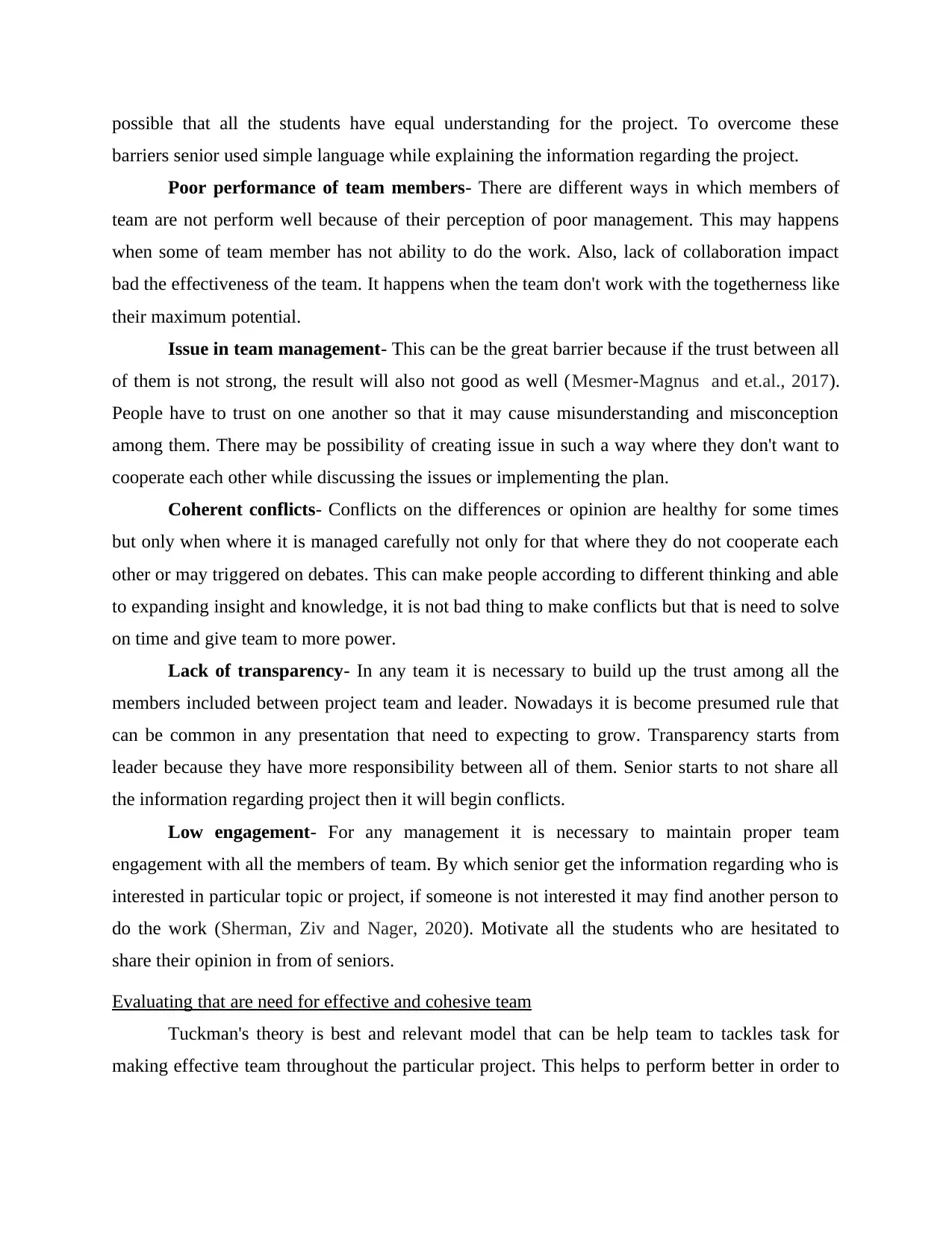
possible that all the students have equal understanding for the project. To overcome these
barriers senior used simple language while explaining the information regarding the project.
Poor performance of team members- There are different ways in which members of
team are not perform well because of their perception of poor management. This may happens
when some of team member has not ability to do the work. Also, lack of collaboration impact
bad the effectiveness of the team. It happens when the team don't work with the togetherness like
their maximum potential.
Issue in team management- This can be the great barrier because if the trust between all
of them is not strong, the result will also not good as well (Mesmer-Magnus and et.al., 2017).
People have to trust on one another so that it may cause misunderstanding and misconception
among them. There may be possibility of creating issue in such a way where they don't want to
cooperate each other while discussing the issues or implementing the plan.
Coherent conflicts- Conflicts on the differences or opinion are healthy for some times
but only when where it is managed carefully not only for that where they do not cooperate each
other or may triggered on debates. This can make people according to different thinking and able
to expanding insight and knowledge, it is not bad thing to make conflicts but that is need to solve
on time and give team to more power.
Lack of transparency- In any team it is necessary to build up the trust among all the
members included between project team and leader. Nowadays it is become presumed rule that
can be common in any presentation that need to expecting to grow. Transparency starts from
leader because they have more responsibility between all of them. Senior starts to not share all
the information regarding project then it will begin conflicts.
Low engagement- For any management it is necessary to maintain proper team
engagement with all the members of team. By which senior get the information regarding who is
interested in particular topic or project, if someone is not interested it may find another person to
do the work (Sherman, Ziv and Nager, 2020). Motivate all the students who are hesitated to
share their opinion in from of seniors.
Evaluating that are need for effective and cohesive team
Tuckman's theory is best and relevant model that can be help team to tackles task for
making effective team throughout the particular project. This helps to perform better in order to
barriers senior used simple language while explaining the information regarding the project.
Poor performance of team members- There are different ways in which members of
team are not perform well because of their perception of poor management. This may happens
when some of team member has not ability to do the work. Also, lack of collaboration impact
bad the effectiveness of the team. It happens when the team don't work with the togetherness like
their maximum potential.
Issue in team management- This can be the great barrier because if the trust between all
of them is not strong, the result will also not good as well (Mesmer-Magnus and et.al., 2017).
People have to trust on one another so that it may cause misunderstanding and misconception
among them. There may be possibility of creating issue in such a way where they don't want to
cooperate each other while discussing the issues or implementing the plan.
Coherent conflicts- Conflicts on the differences or opinion are healthy for some times
but only when where it is managed carefully not only for that where they do not cooperate each
other or may triggered on debates. This can make people according to different thinking and able
to expanding insight and knowledge, it is not bad thing to make conflicts but that is need to solve
on time and give team to more power.
Lack of transparency- In any team it is necessary to build up the trust among all the
members included between project team and leader. Nowadays it is become presumed rule that
can be common in any presentation that need to expecting to grow. Transparency starts from
leader because they have more responsibility between all of them. Senior starts to not share all
the information regarding project then it will begin conflicts.
Low engagement- For any management it is necessary to maintain proper team
engagement with all the members of team. By which senior get the information regarding who is
interested in particular topic or project, if someone is not interested it may find another person to
do the work (Sherman, Ziv and Nager, 2020). Motivate all the students who are hesitated to
share their opinion in from of seniors.
Evaluating that are need for effective and cohesive team
Tuckman's theory is best and relevant model that can be help team to tackles task for
making effective team throughout the particular project. This helps to perform better in order to
Paraphrase This Document
Need a fresh take? Get an instant paraphrase of this document with our AI Paraphraser
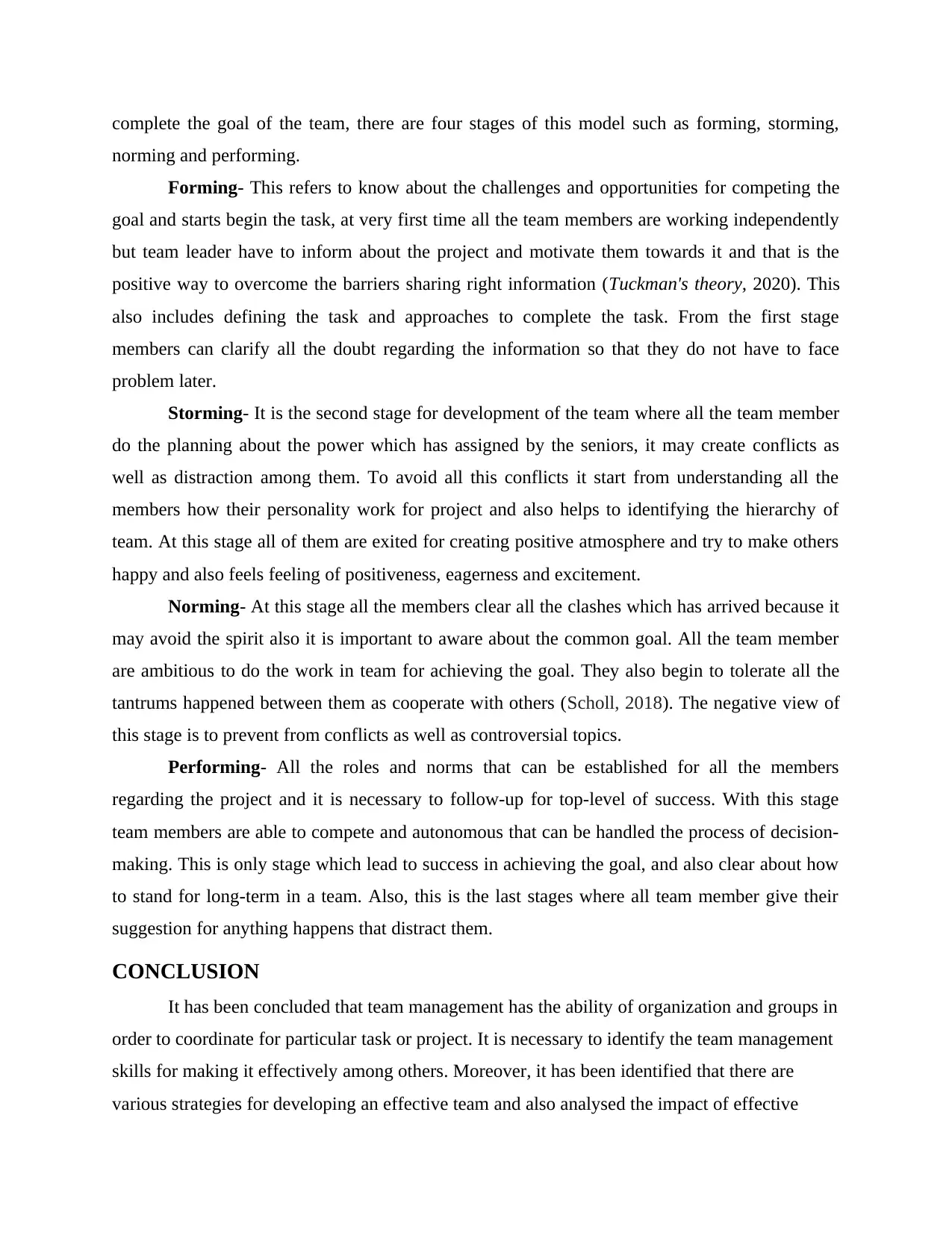
complete the goal of the team, there are four stages of this model such as forming, storming,
norming and performing.
Forming- This refers to know about the challenges and opportunities for competing the
goal and starts begin the task, at very first time all the team members are working independently
but team leader have to inform about the project and motivate them towards it and that is the
positive way to overcome the barriers sharing right information (Tuckman's theory, 2020). This
also includes defining the task and approaches to complete the task. From the first stage
members can clarify all the doubt regarding the information so that they do not have to face
problem later.
Storming- It is the second stage for development of the team where all the team member
do the planning about the power which has assigned by the seniors, it may create conflicts as
well as distraction among them. To avoid all this conflicts it start from understanding all the
members how their personality work for project and also helps to identifying the hierarchy of
team. At this stage all of them are exited for creating positive atmosphere and try to make others
happy and also feels feeling of positiveness, eagerness and excitement.
Norming- At this stage all the members clear all the clashes which has arrived because it
may avoid the spirit also it is important to aware about the common goal. All the team member
are ambitious to do the work in team for achieving the goal. They also begin to tolerate all the
tantrums happened between them as cooperate with others (Scholl, 2018). The negative view of
this stage is to prevent from conflicts as well as controversial topics.
Performing- All the roles and norms that can be established for all the members
regarding the project and it is necessary to follow-up for top-level of success. With this stage
team members are able to compete and autonomous that can be handled the process of decision-
making. This is only stage which lead to success in achieving the goal, and also clear about how
to stand for long-term in a team. Also, this is the last stages where all team member give their
suggestion for anything happens that distract them.
CONCLUSION
It has been concluded that team management has the ability of organization and groups in
order to coordinate for particular task or project. It is necessary to identify the team management
skills for making it effectively among others. Moreover, it has been identified that there are
various strategies for developing an effective team and also analysed the impact of effective
norming and performing.
Forming- This refers to know about the challenges and opportunities for competing the
goal and starts begin the task, at very first time all the team members are working independently
but team leader have to inform about the project and motivate them towards it and that is the
positive way to overcome the barriers sharing right information (Tuckman's theory, 2020). This
also includes defining the task and approaches to complete the task. From the first stage
members can clarify all the doubt regarding the information so that they do not have to face
problem later.
Storming- It is the second stage for development of the team where all the team member
do the planning about the power which has assigned by the seniors, it may create conflicts as
well as distraction among them. To avoid all this conflicts it start from understanding all the
members how their personality work for project and also helps to identifying the hierarchy of
team. At this stage all of them are exited for creating positive atmosphere and try to make others
happy and also feels feeling of positiveness, eagerness and excitement.
Norming- At this stage all the members clear all the clashes which has arrived because it
may avoid the spirit also it is important to aware about the common goal. All the team member
are ambitious to do the work in team for achieving the goal. They also begin to tolerate all the
tantrums happened between them as cooperate with others (Scholl, 2018). The negative view of
this stage is to prevent from conflicts as well as controversial topics.
Performing- All the roles and norms that can be established for all the members
regarding the project and it is necessary to follow-up for top-level of success. With this stage
team members are able to compete and autonomous that can be handled the process of decision-
making. This is only stage which lead to success in achieving the goal, and also clear about how
to stand for long-term in a team. Also, this is the last stages where all team member give their
suggestion for anything happens that distract them.
CONCLUSION
It has been concluded that team management has the ability of organization and groups in
order to coordinate for particular task or project. It is necessary to identify the team management
skills for making it effectively among others. Moreover, it has been identified that there are
various strategies for developing an effective team and also analysed the impact of effective
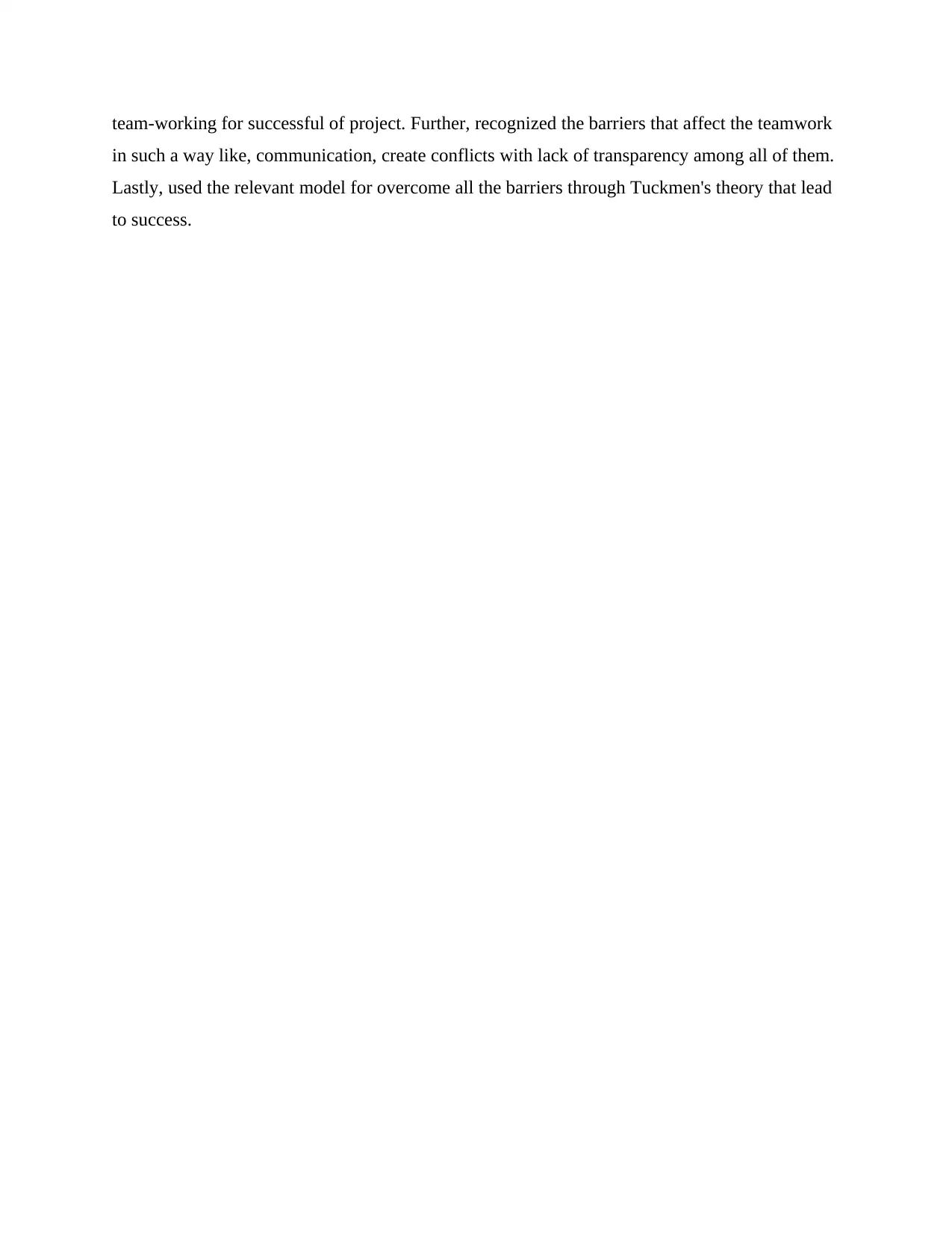
team-working for successful of project. Further, recognized the barriers that affect the teamwork
in such a way like, communication, create conflicts with lack of transparency among all of them.
Lastly, used the relevant model for overcome all the barriers through Tuckmen's theory that lead
to success.
in such a way like, communication, create conflicts with lack of transparency among all of them.
Lastly, used the relevant model for overcome all the barriers through Tuckmen's theory that lead
to success.
⊘ This is a preview!⊘
Do you want full access?
Subscribe today to unlock all pages.

Trusted by 1+ million students worldwide
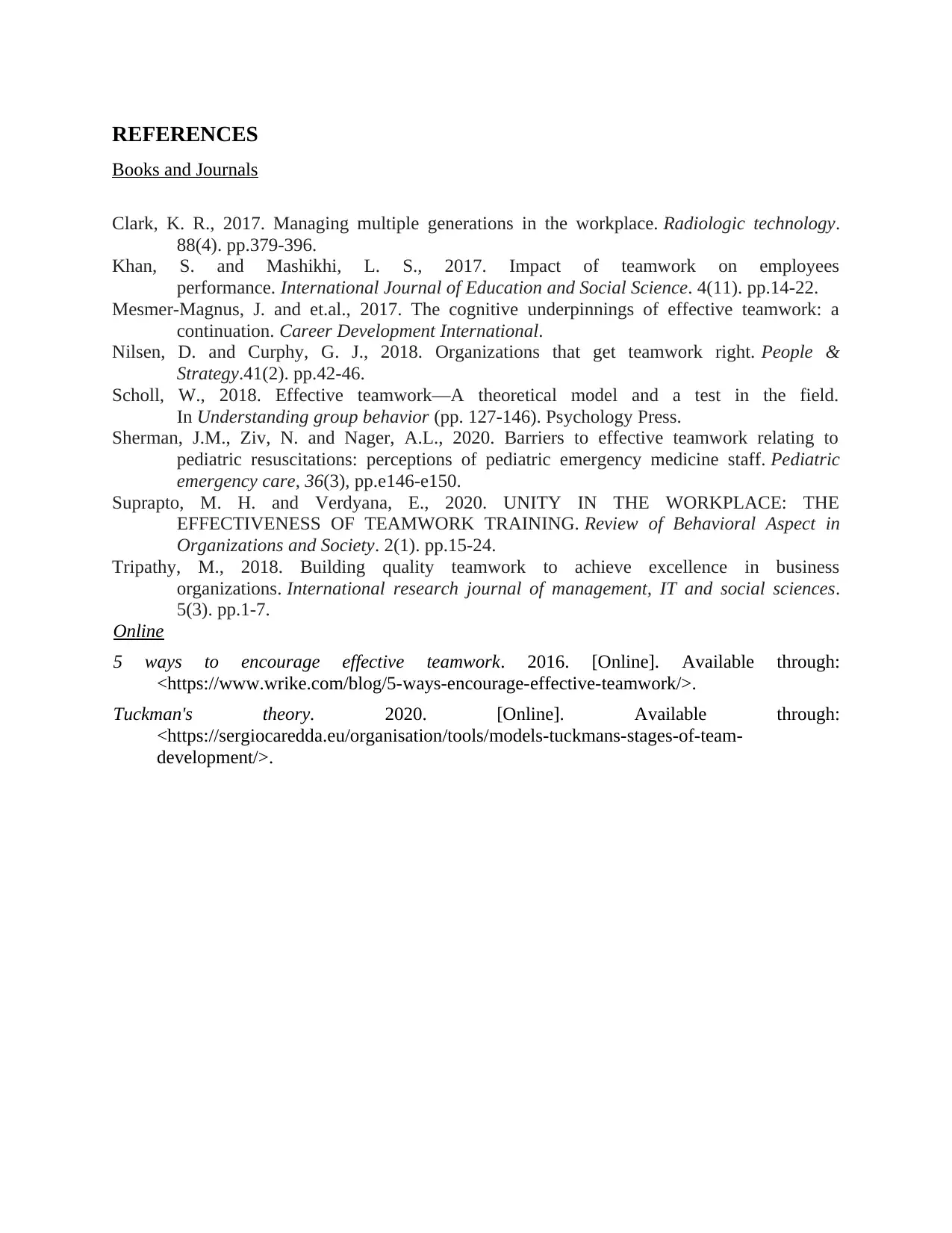
REFERENCES
Books and Journals
Clark, K. R., 2017. Managing multiple generations in the workplace. Radiologic technology.
88(4). pp.379-396.
Khan, S. and Mashikhi, L. S., 2017. Impact of teamwork on employees
performance. International Journal of Education and Social Science. 4(11). pp.14-22.
Mesmer-Magnus, J. and et.al., 2017. The cognitive underpinnings of effective teamwork: a
continuation. Career Development International.
Nilsen, D. and Curphy, G. J., 2018. Organizations that get teamwork right. People &
Strategy.41(2). pp.42-46.
Scholl, W., 2018. Effective teamwork—A theoretical model and a test in the field.
In Understanding group behavior (pp. 127-146). Psychology Press.
Sherman, J.M., Ziv, N. and Nager, A.L., 2020. Barriers to effective teamwork relating to
pediatric resuscitations: perceptions of pediatric emergency medicine staff. Pediatric
emergency care, 36(3), pp.e146-e150.
Suprapto, M. H. and Verdyana, E., 2020. UNITY IN THE WORKPLACE: THE
EFFECTIVENESS OF TEAMWORK TRAINING. Review of Behavioral Aspect in
Organizations and Society. 2(1). pp.15-24.
Tripathy, M., 2018. Building quality teamwork to achieve excellence in business
organizations. International research journal of management, IT and social sciences.
5(3). pp.1-7.
Online
5 ways to encourage effective teamwork. 2016. [Online]. Available through:
<https://www.wrike.com/blog/5-ways-encourage-effective-teamwork/>.
Tuckman's theory. 2020. [Online]. Available through:
<https://sergiocaredda.eu/organisation/tools/models-tuckmans-stages-of-team-
development/>.
Books and Journals
Clark, K. R., 2017. Managing multiple generations in the workplace. Radiologic technology.
88(4). pp.379-396.
Khan, S. and Mashikhi, L. S., 2017. Impact of teamwork on employees
performance. International Journal of Education and Social Science. 4(11). pp.14-22.
Mesmer-Magnus, J. and et.al., 2017. The cognitive underpinnings of effective teamwork: a
continuation. Career Development International.
Nilsen, D. and Curphy, G. J., 2018. Organizations that get teamwork right. People &
Strategy.41(2). pp.42-46.
Scholl, W., 2018. Effective teamwork—A theoretical model and a test in the field.
In Understanding group behavior (pp. 127-146). Psychology Press.
Sherman, J.M., Ziv, N. and Nager, A.L., 2020. Barriers to effective teamwork relating to
pediatric resuscitations: perceptions of pediatric emergency medicine staff. Pediatric
emergency care, 36(3), pp.e146-e150.
Suprapto, M. H. and Verdyana, E., 2020. UNITY IN THE WORKPLACE: THE
EFFECTIVENESS OF TEAMWORK TRAINING. Review of Behavioral Aspect in
Organizations and Society. 2(1). pp.15-24.
Tripathy, M., 2018. Building quality teamwork to achieve excellence in business
organizations. International research journal of management, IT and social sciences.
5(3). pp.1-7.
Online
5 ways to encourage effective teamwork. 2016. [Online]. Available through:
<https://www.wrike.com/blog/5-ways-encourage-effective-teamwork/>.
Tuckman's theory. 2020. [Online]. Available through:
<https://sergiocaredda.eu/organisation/tools/models-tuckmans-stages-of-team-
development/>.
1 out of 10
Related Documents
Your All-in-One AI-Powered Toolkit for Academic Success.
+13062052269
info@desklib.com
Available 24*7 on WhatsApp / Email
![[object Object]](/_next/static/media/star-bottom.7253800d.svg)
Unlock your academic potential
Copyright © 2020–2025 A2Z Services. All Rights Reserved. Developed and managed by ZUCOL.




